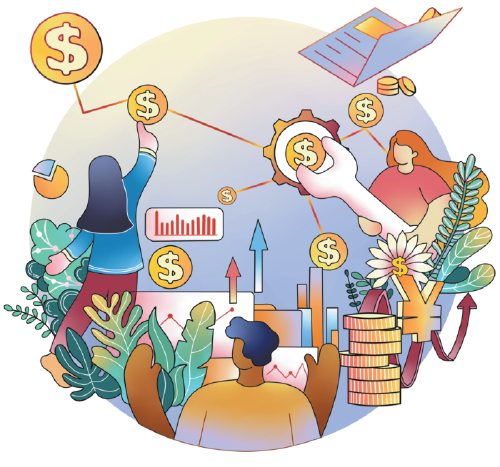Avoiding another lost decade
Latin American countries must learn from history and not make the mistakes of the past

Latin American countries must learn from history and not make the mistakes of the past

The international scenario is being impacted by a series of crises contributing to increased economic uncertainties. We can mention the combined effects of the COVID-19 pandemic, the conflict between Russia and Ukraine, the unilateral sanctions of the United States on China, the increase in commodity prices, the rise in inflation, and the disruption of global supply chains.
Inflation is an aspect of the crisis that deserves attention, although the phenomenon is not as widespread as Western economic analysts suggest when observing the annualized inflation of the G20 countries for May 2022.There are three countries whose rates are far from the average, such as Turkey (73.5 percent), Argentina (60.7 percent), and Russia (17.1 percent).
The average inflation in the 17 remaining countries was 6.3 percent. There are five above-average countries: Brazil, the United Kingdom, the Netherlands, Spain and the US. Five others-such as Indonesia, Switzerland, Japan, Saudi Arabia and China-are well below average. At 2.1 percent, inflation in China is the lowest among the G20 nations. It is, in fact, a third of the average in the 17 selected countries.
Inflation is not a global problem but the result of national policy choices, even considering the sharp rise in prices of commodities such as oil and wheat. In this regard, the situation in the US must be viewed with particular attention, given how it influences the international financial system thanks to the dominant role of the US dollar. There, the 8.6 percent inflation in May is the highest since 1981.
Much of the inflationary surge stems from the US' decisions, such as taking artificial measures to counter the drop in demand in the post-pandemic period, the imposition of arbitrary tariffs on the import of industrial goods, notably from China, restrictions on the production and marketing of semiconductors, and, finally, the imposition of sanctions against Russia. The result is the rise in production costs, the paralysis of highly integrated production chains, and the scarcity of many goods. The rising cost of energy is directly related to the sanctions against Russian gas and oil.
In light of this fact, the Federal Reserve raised its short-term interest rates by 75 basis points on June 15, the highest since 1994.However, Fed officials predict that by the end of 2022, the interest rate on federal bonds could be in the range of 3.25 percent to 3.5 percent, and reach 4 percent by 2023.
The change in the interest rate in the US has global impacts, as it increases the cost of borrowing, contributes to the appreciation of the dollar, reduces international financial liquidity, and could cause a recession in the world's largest economy, before spreading across the globe.
The impact of the Fed's measures are systemic but particularly painful for Latin American countries, the immediate periphery of the US, as the region specializes in exporting agricultural, energy, and mineral commodities, apart from being dependent on external capital flows to finance the balance of payments and the rollover of its public debts.
History can illustrate the impacts of a sudden change in US interest rates. After the second oil shock, in 1979-1980, the Fed raised interest rates to unimaginable levels: between August 1979 and June 1981, the basic interest rate went from a monthly average of 10.94 percent to peak at 19.1 percent in June 1981. As the US economy entered recession, the dollar appreciated sharply, reversing the fall that began with the end of the Bretton Woods fixed parities in 1971. The large trade deficit between 1981 and 1985 was offset by a strong capital inflow into the Balance of Payments capital account. The price of oil fell, in constant values, from almost $120 in 1980 to less than $40 in 1989.
From the point of view of the economy of Latin American countries, the sudden increase in interest rates caused the debt crisis that lasted throughout the 1980s, the so-called lost decade. The recession in the US worsened the situation, as the drop in exports from Latin America reduced the revenue needed to meet interest and debt repayments. In August 1982, Mexico declared a debt moratorium, followed by Brazil, the largest debtor among developing countries, in November of that year.
History is essential for understanding the gravity of the situation, but current economic and political conditions are pretty different from those of the early 1980s. Latin America's dependence on the US market has greatly diminished since then. International demand for food and raw materials is concentrated in Asia, mainly in China, which is now the largest trading partner of Brazil, Chile, Argentina and Peru. The US and the EU are no longer the only sources of productive investment. China has significant cooperation with the region through direct investment or loans, especially through the Belt and Road Initiative. Similarly, countries in Latin America are not trapped in the Cold War, as they are managing to establish new partnerships with China, India, Russia and African countries.
However, despite finding a more favorable international environment now, Latin American countries face difficulties in dealing with their own limitations. Brazil, for example, raised interest rates to 13.5 percent despite facing massive unemployment, low investment rates, and stagnation of GDP.Such measures that only seek to contain the expansion of public debt without the counterpart of increasing GDP are disastrous.
The neoliberal logic of TINA(there is no alternative), the Washington Consensus, and the labeling of US and UK rating agencies are no longer acceptable. The Latin American region needs to overcome this paradigm and learn from the experience of countries that manage to guarantee growth and control inflation despite international turmoil. It is necessary to innovate in economic policy and explore cooperation with other developing countries. There will be great difficulties, but the region should not repeat mistakes and fall back into a lost decade.
The author is a professor of international political economy at Sao Paulo State University. The author contributed this article to China Watch, a think tank powered by China Daily. The views do not necessarily reflect those of China Daily.
Contact the editor at [email protected]


































